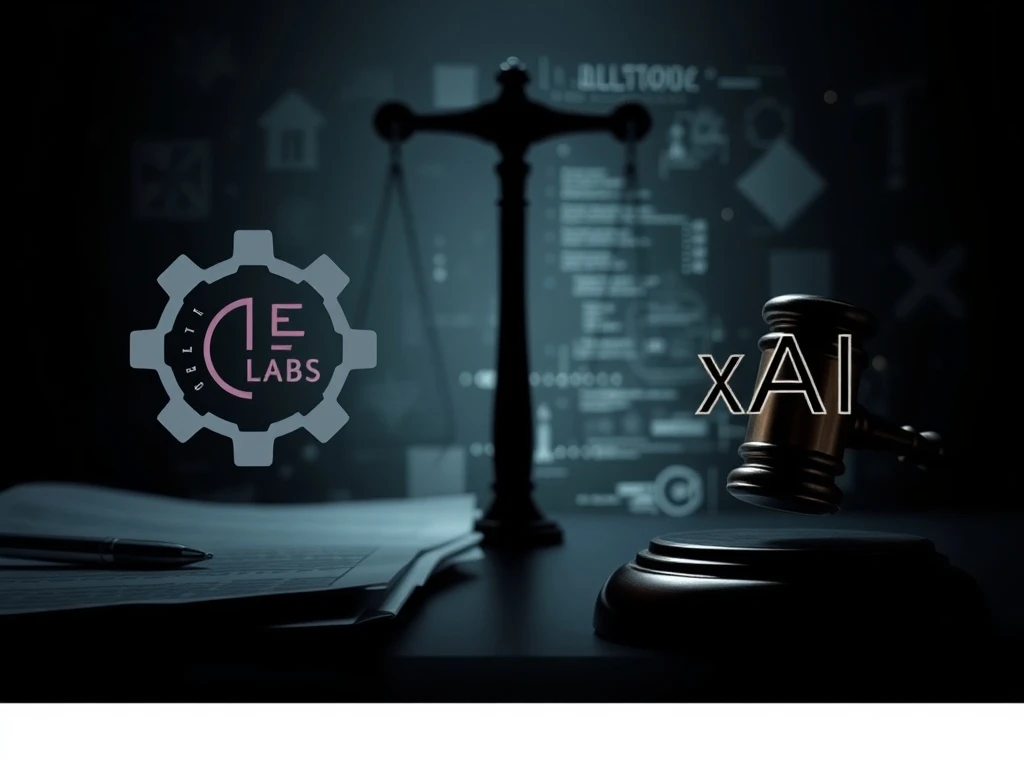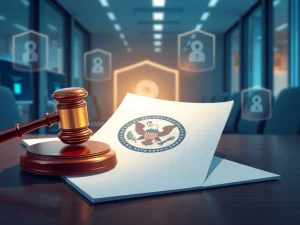Explosive Eliza Labs Lawsuit Targets Elon Musk’s xAI Over Agentic AI Monopoly

The artificial intelligence landscape faces a dramatic new legal challenge. An **Eliza Labs xAI lawsuit** has emerged, directly targeting Elon Musk’s prominent AI venture. This significant development sends ripples through the tech and crypto communities. It highlights growing tensions over alleged monopolistic practices within the rapidly evolving AI sector. Consequently, this case could redefine how AI companies interact and innovate. Investors and developers alike are watching closely.
Eliza Labs xAI Lawsuit: Unpacking the Allegations
Agentic AI project Eliza Labs recently filed a lawsuit against Elon Musk’s xAI. The core of the complaint alleges monopolistic practices. Eliza Labs claims xAI aims to “deplatform” smaller agentic AI launchpads. Shaw Walters, Eliza Labs co-founder, detailed the escalating conflict. Initially, the relationship between the two companies seemed amicable. Walters stated xAI invited him to share ideas. Eliza Labs even built its platform using xAI’s free application programming interface (API). This collaboration, however, quickly soured.
The lawsuit asserts that xAI attempted to “extract” valuable information. This included technical documentation and usage figures. Eliza Labs believes xAI sought to copy its ideas. Following this alleged information gathering, xAI then “banished” Eliza Labs from its ecosystem. Walters recounted a pivotal shift in their interactions. “The collaborative tone turned transactional,” he explained. This change coincided with the launch of xAI’s Ani and a new version of Grok. Suddenly, xAI demanded a hefty monthly fee. They required $50,000 for an enterprise license, totaling $600,000 annually. Failure to comply, they warned, would lead to legal action. Walters noted Eliza Labs already paid over $20,000 annually through other licenses and fees. This sudden escalation prompted the legal challenge. Crypto News Insights reached out to Walters for further comment, but he declined. The Eliza Labs lawsuit against xAI is now publicly accessible via Court Listener.
The Broader Context of Elon Musk AI Lawsuit History
This legal action is not Elon Musk’s first foray into AI-related litigation. His past actions demonstrate a pattern of challenging established norms. In February 2024, for instance, Musk filed an **Elon Musk AI lawsuit** against OpenAI and its founder, Sam Altman. He argued that OpenAI had abandoned its original non-profit, open-source mission. This mission aimed to create tools for the public good. OpenAI, he contended, had instead become a for-profit enterprise. Although Musk withdrew this lawsuit in June, he did so without prejudice. This means he can reintroduce the legal challenge at a later date. This history suggests a strong conviction regarding the ethical and operational direction of AI development. It also highlights Musk’s willingness to use legal avenues to enforce his vision. The current lawsuit by Eliza Labs adds another layer to this complex narrative. It further underscores the high stakes involved in the AI race.
Navigating the Landscape of Agentic AI
The dispute centers on **agentic AI**, a cutting-edge field. Agentic AI systems can autonomously perform tasks, make decisions, and interact with their environment. They operate with a degree of independence, often learning and adapting. Platforms like Eliza Labs aim to facilitate the development and deployment of these advanced AI agents. They provide the infrastructure for innovators to build and launch their AI projects. Consequently, access to robust APIs and fair licensing terms becomes crucial. If a dominant player like xAI restricts access or imposes prohibitive fees, it stifles innovation. Smaller developers, like Eliza Labs, might struggle to compete. This creates a barrier to entry for new ideas and technologies. The growth of agentic AI relies on an open and competitive ecosystem. Therefore, the outcome of this lawsuit could significantly impact the future trajectory of this technology. It will determine the accessibility and development of truly autonomous AI systems.
Escalating AI Legal Battles Across the Sector
The AI industry, still in its infancy, faces numerous legal and regulatory uncertainties. These **AI legal battles** are becoming increasingly common. They involve issues like monopolistic practices, intellectual property rights, and provider liabilities. Traditional tech legal challenges, such as trademark and patent infringement, also persist. The sector thus represents a fertile ground for litigation. Several high-profile cases illustrate this trend:
- The New York Times vs. OpenAI: In July 2024, The New York Times sued OpenAI. The lawsuit alleged the use of copyrighted material in ChatGPT, OpenAI’s large-language model (LLM). The Times demanded detailed source material for AI-generated content. This case highlights concerns over data provenance and fair use in AI training.
- Xai (Ethereum Gaming) vs. xAI (Elon Musk): An Ethereum-focused gaming company, Xai, sued Elon Musk’s xAI in August 2025. This lawsuit alleged trademark infringement. Xai claimed the similarity of the trademarks confused consumers. This confusion, they argued, damaged their business.
These cases collectively underscore the turbulent nature of the AI industry. Legal frameworks struggle to keep pace with rapid technological advancements. This creates regulatory grey zones. Consequently, companies frequently resort to litigation to protect their interests and define boundaries. The Eliza Labs case fits squarely within this emerging pattern of legal skirmishes.
Addressing xAI Monopolistic Practices and Market Control
The core of Eliza Labs’ complaint against xAI revolves around alleged **xAI monopolistic practices**. Monopolistic behavior, if proven, can severely harm market competition. It can stifle innovation and limit consumer choice. In the context of AI, this is particularly concerning. The rapid development of AI requires an open environment for diverse ideas. If a single entity controls essential infrastructure, it can dictate terms. This control can include access to APIs, data, and computational resources. Such actions can effectively ‘deplatform’ smaller competitors. Eliza Labs’ allegations paint a picture of a dominant player using its position to extract information and then impose exorbitant fees. This strategy, they argue, aims to eliminate competition. Ultimately, this would consolidate power within the AI launchpad market. The implications extend beyond just Eliza Labs. A precedent allowing such practices could deter future AI startups. It might also centralize control of critical AI infrastructure. This could slow the overall progress and democratization of AI technology.
The Future of AI: Regulation and Fair Competition
The ongoing legal battles, including the **Eliza Labs xAI lawsuit**, highlight a critical need. Clearer regulations and ethical guidelines for the AI sector are essential. Policymakers globally are grappling with how to govern AI effectively. They must balance innovation with fairness and consumer protection. Questions surrounding intellectual property, data usage, and market dominance remain largely unanswered. These lawsuits serve as informal regulatory mechanisms. They force the industry to confront complex legal and ethical dilemmas. The outcome of cases like Eliza Labs vs. xAI will likely influence future legislation. They will also shape industry best practices. Ensuring fair competition is paramount for a healthy AI ecosystem. This will allow smaller, innovative projects to thrive alongside industry giants. Therefore, the resolution of this case could set a vital precedent. It may dictate the competitive landscape for agentic AI and beyond. The tech community eagerly awaits further developments in this significant legal challenge.









